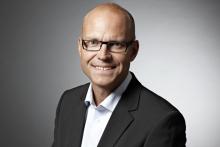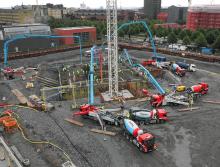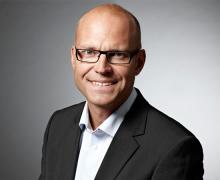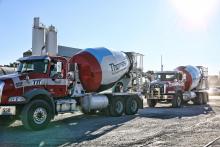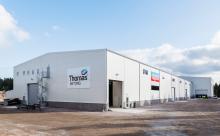The Thomas Concrete Group is a Swedish family-owned company operating in Sweden, Norway, Germany, Poland and the U.S., which in 2018 produced and distributed 5.3 million m³ of high-quality concrete for cast in pace construction. Guy Woodford, editor of our sister title Aggregates Business, spoke to the company’s chief executive and president, Hans Karlander, who believes organic growth and a firm focus on environmentally friendly products are key to boosting the group’s current SEK 6.5 billion (€635mn) annual turnover.
What have the Romans ever done for us?” – John Cleese’s character Reg famously demanded to know during Monty Python’s brilliant film, Life of Brian. As well as sanitation, medicine, roads, aqueducts, wine and peace - all quoted by members of The People’s Front of Judea (PFJ) in response to a perturbed Reg’s question - they gave us Roman concrete, for which Hans Karlander is truly thankful.
“I’ve always been fascinated by concrete. It has been used in various ways for 2,000 years; the buildings built with it in Rome are still there, and concrete buildings in other cities are still there despite being the scene of devastating happenings. It is a lasting material,” enthuses the Thomas Concrete Group CEO and president. ““It would be strange if concrete was not part of our future. What is more sustainable than it? It is the very definition of ‘sustainability’ as it also absorbs CO2 and is 100% recyclable.”
Based on a hydraulic-setting cement, Roman concrete, opus caementicium in Latin, was used in construction during the late Roman Republic until the fading of the Roman Empire. It differs materially in several ways from modern concrete, based on Portland cement, which is going through something of a green revolution in its production.
Many of Thomas Concrete Group’s own Thomas-branded concrete product range offers a lower CO2 footprint, such as Thomagreen and Thomagarage, while the company’s Thomaplatta pre-cast concrete using recycled aggregates is available to customers in Sweden and Norway.
“Environmentally friendly products are a very important part of our offer, as is communicating their benefits to customers. We have come a long way in Germany with our recycled products, and we aim to roll out more and more recycled products in all our trading markets. We have a very big responsibility to our planet and how we use its resources; that is true of the aggregates industry as well as the concrete industry.”
Established in 1955 in Karlstad, Sweden, by Martin Thomas, with its headquarters in Gothenburg, Sweden, Thomas Concrete Group has a footprint of 152 ready-mixed concrete plants in its five trading countries – 79 across Sweden, Norway, Germany and Poland, and 73 in USA.
Thomas Concrete Group’s subsidiary in Sweden is Thomas Betong AB. Thomas Cement, another group subsidiary, is a trading and distribution company for among other things, alternative binding material for the Swedish market. The company is also responsible for securing and developing the group’s long-term supply of independently sourced alternative binders, and other raw materials. Thomas Cement currently has three terminals, in Landskrona, Oxelösund and Uddevalla, with an annual capacity of 160,000 tonnes.
“When Martin Thomas founded the business in Sweden, there was a natural geographic tie to Norway, and he had close family ties with Germany,” explains Karlander. “Germany is an important market to be in if you are a European company. It’s the locomotive of European industry, and business culture-wise. Germany and Sweden are also close in that aspect. It was a natural step to go further east when the Eastern Bloc countries of Central and Eastern Europe opened up to Western Bloc business [late 1980s-early 1990s], and we started operating in Poland in 1997.
“We always saw the importance of having a balance between our trading in Europe and the U.S. We want to share the risks and the opportunities and be a very long-term player [in the concrete sector].”
Talking about Thomas Concrete Group’s current and likely 2019 trading environment, the Thomas Concrete Group CEO says: “We have had pretty strong years in 2017 and 2018. At the same time, we all know that the global economy is at its peak, with several uncertain factors around us: how China develops, Brexit and the European Community, what is happening in the U.S., and how these factors come together.
“For us, 2019 is looking a bit more uncertain. Raw material prices are increasing, and our customers are reluctant to pay more.
“We have during the last few years looked for organic as well as structural growth. We are looking to grow in the U.S. as well as in Europe. We are a family-owned company and everything we do, we do step-by-step with a very long-term perspective in mind.
“Developing our sales network is important. We have plans to expand our U.S operations. We have a fair share of the market but would like to make our geographical footprint larger. Our headquarters is in Atlanta, and we are already well established in Georgia, North Carolina and South Carolina.”
Karlander says Thomas Concrete Group is looking to introduce more “climate-friendly” concrete products in the U.S., as well as in Europe, in the next 12-18 months.
In September 2018, the group surpassed 20 million pounds of cumulative CO2 savings in the U.S. using CarbonCure bolt-on technology [technology for existing concrete plants that allows producers to sequester CO2 into their concrete products]. After initially installing the CarbonCure bolt-on technology on a single plant in Atlanta in February 2016, Thomas Concrete Group has been rolling out installations of the innovative CO2-recycling solution. Currently, 25 U.S. group plants have been equipped with CarbonCure bolt-on technology.
“At the same time as creating a more environmentally friendly product, the use of CarbonCure bolt-on technology enables us to produce concrete more efficiently, such as by reducing a product’s cement content,” summarises Karlander.
Karlander, 52, who is six-and-a-half-years into his dual role of Thomas Concrete Group CEO and president, says demand for the company’s tailor-made and special-purpose concrete products has increased “substantially” in recent years.
“They are always up for discussion and evaluation if there are special projects, or certain circumstances around projects; such as a specific bridge or skyscraper. I think most concrete suppliers have seen demand for these kinds of products rise in the last few years.”
Karlander says Thomas Concrete Group is looking to take advantage of Industry 4.0, a name given to the current trend of automation and data exchange in manufacturing technologies, to help enhance its product research and development.
“New and complementing binding materials are of great interest to us, as are new admixtures. It will be interesting to see how these can change what we can offer to customers, in terms of better products. If you top that up with the digital movement that is around us right now, this will help us serve customers in a better way, by reducing lead times, and allow us to better control quality and be more efficient in general.”
A mechanical engineering graduate, Karlander worked for 14 years in the automotive engineering sector followed by executive roles in the paper and forestry industries, before becoming Thomas Concrete Group CEO and president in 2012.
Asked how he describes his leadership style, the personable Karlander, who grew up in Sjuntorp, a village on Sweden’s west coast, around an hour’s drive north-east of Gothenburg, is quick to emphasise the importance of good relationships between employees. “I’m a firm believer in a company being about people. It’s about how we relate to other people. I’m very team orientated but also very results orientated. I like being part of the detail and the numbers.”
Married and a proud dad of two daughters and a son, aged 16 to 21, Karlander enjoys being a key part of what has always been a Swedish family-owned company.
“Martin Thomas had three children and after his time running the firm, his son became CEO and president for 25 years. I’m only the Thomas Concrete Group’s third CEO and president.
“Concrete is natural, creative and recyclable. It is nice to work for a company and within an industry that is helping customers build a society around us.”
As with any senior management role, Karlander is left with little time to enjoy interests and hobbies outside work. However, he still finds time to play sports such as tennis and floorball. “Floorball is a Swedish game like hockey and is played indoors by teams carrying sticks used to hit a small plastic ball. It’s a great high-energy sport that is very popular in Sweden and in other parts of Scandinavia. It’s also big in Switzerland and Asia.”
Floorball. That’s one thing the Romans never invented for us, hey Reg!
